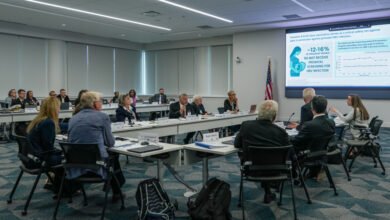
▼ Summary
– Robert F. Kennedy Jr. has directed the CDC to study whether SSRIs contribute to mass violence, though experts state current data does not support a causative link.
– Multiple studies have found no direct association between psychotropic medication use and mass shootings, with rates of use among shooters often lower than in the general public.
– The California State Association of Psychiatrists rebutted Kennedy’s claims, warning that such statements may deter people from seeking necessary mental health care.
– Research indicates suicidality is a significant factor in mass shootings, but any link to antidepressants is correlational due to worse depression in those treated, not causative.
– Kennedy has a history of pushing unsupported scientific claims and overriding expert consensus, raising concerns about the integrity of any SSRI study he initiates.
The debate surrounding the causes of mass shootings has taken a new turn, with U.S. Secretary of Health and Human Services Robert F. Kennedy Jr. proposing an investigation into whether antidepressant medications, particularly SSRIs, are linked to mass violence. Kennedy recently announced on social media that he intends to direct the Centers for Disease Control and Prevention to examine what he calls the “long-taboo question” of whether psychoactive drugs contribute to such tragedies. However, many mental health experts and scientific studies challenge this premise, pointing to a lack of evidence supporting a causal connection.
Gregory Scott Brown, Chair of the American Psychiatric Association’s Council on Communications, emphasized that SSRIs are generally safe and effective, with no substantial data indicating they lead patients to commit violent acts. This perspective is shared widely among clinicians who rely on these medications to treat depression and anxiety disorders.
Kennedy’s focus on SSRIs is not new. Following a school shooting in Minnesota last August, he appeared on Fox News pledging to study the role of psychiatric drugs in mass violence. He reiterated this commitment in September while presenting his “Make America Healthy Again” report, though he shifted the proposed research responsibility to the National Institutes of Health.
Speculation about psychiatric drugs and mass shootings has surfaced repeatedly over the years. For example, some questioned whether anti-anxiety medications influenced the 2017 Las Vegas shooter. Contrary to Kennedy’s suggestion that researchers avoid this topic, multiple studies have explored possible associations.
A 2019 analysis of FBI school shooting data from 2000 to 2017 found that most perpetrators had no documented use of psychotropic drugs. Even in cases where medications were involved, researchers identified no direct or causal link to violence. Another study from the same year, using data from The Violence Project, reported that about 20% of mass shooters had used psychotropic medications, a rate comparable to the general population.
More recently, a Columbia University research team led by Professor Ragy Girgis analyzed over 800 U.S. mass shootings. They discovered that only 4% of shooters had ever used antidepressants, which is significantly lower than the general public’s usage rate of 12%. Just 6.6% had any history of psychotropic drug use.
The California State Association of Psychiatrists issued a strong rebuttal to Kennedy’s claims, warning that such statements could deter individuals from seeking necessary mental health care.
Understanding mass shootings requires examining multiple factors. While severe mental illness like psychosis plays a role in a small percentage of cases, around 5%, according to a 2022 Columbia study, suicidality appears far more relevant. Approximately half of mass shooters die by suicide or instigate “suicide by cop,” and about two-thirds exhibit suicidal thoughts before or during the attack.
Girgis notes that any apparent connection between antidepressants and violence likely stems from the fact that people with severe depression, who are more likely to be prescribed these medications, also experience higher rates of suicidality. He stresses that correlation does not imply causation.
Although SSRIs carry a warning about increased suicidal risk in people under 25, many experts, including Girgis, question its validity. Some studies indicate these drugs may actually reduce suicide risk in young people. Girgis’s recent research found no difference in suicide rates among mass shooters based on antidepressant use.
During his August Fox News interview, Kennedy incorrectly stated that SSRIs carry a black box warning regarding homicidal intent, a claim with no basis in fact.
Girgis suggests that public focus on psychiatric medications in mass shootings may stem from sensationalism. Reports linking shooters to mental health conditions tend to attract more attention, creating a bias in public perception. Others may emphasize medication or mental health issues to divert attention from factors like firearm accessibility.
Most experts support rigorous, unbiased research into all potential causes of mass violence. Brown acknowledges that well-conducted studies can yield valuable insights into medication safety and efficacy.
However, Kennedy’s track record raises concerns about the integrity of such an inquiry. Since leading HHS, he has bypassed scientific protocols, dismissed vaccine safety experts, appointed anti-vaccination allies, and reportedly fired a former CDC chief for resisting unsupported policy changes. He and President Trump have also attempted to link acetaminophen use during pregnancy to autism, a theory lacking conclusive evidence, while pushing for warning labels despite admitting the absence of proof.
This pattern suggests that even in the face of contradictory evidence, Kennedy may pursue and publicize findings that align with his views on SSRIs and mass shootings.
(Source: Gizmodo)
